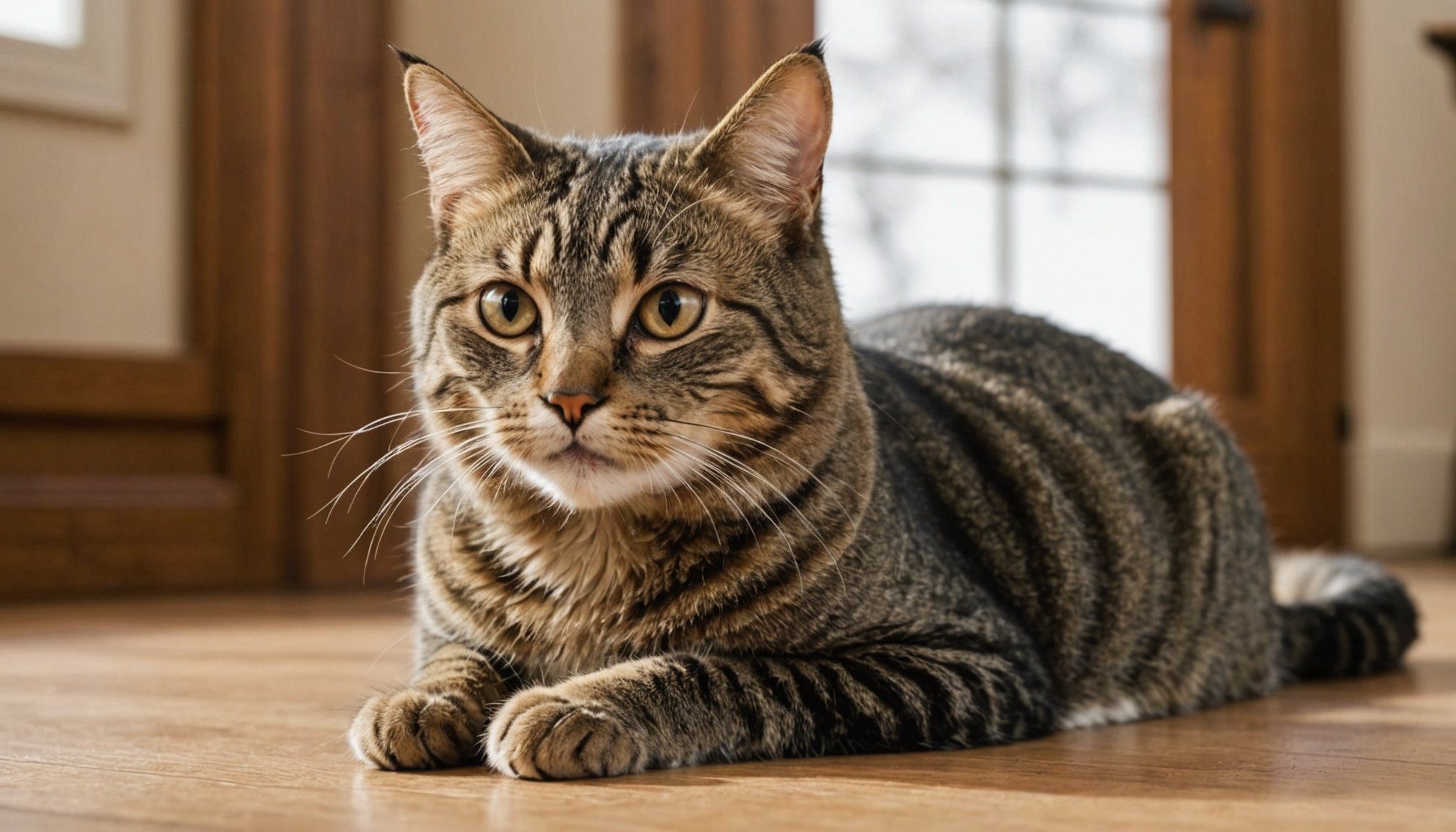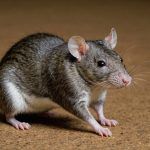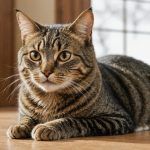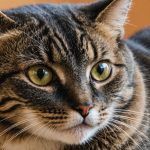Understanding Your Indoor Cat’s Hunting Instincts
Indoor cats possess the same natural hunting instincts as their wild counterparts. These instincts are deeply rooted in their feline behavior, driving them to stalk, pounce, and capture prey. Although your cat may not need to hunt for food, these behaviors are crucial for their mental and physical well-being.
Stimulating these instincts through play is essential for your cat’s overall health. Activities such as using feather wands, laser pointers, or small plush toys that mimic prey can keep your cat engaged and satisfied. This not only provides exercise but also helps to relieve stress and prevent boredom.
Also read : Ultimate guide to creating an ideal feeding routine for your multi-cat household
A common misconception is that indoor cats do not possess strong hunting instincts due to their sheltered environment. However, these instincts are innate and must be addressed to avoid potential behavioral issues. Indoor cats often exhibit hunting behavior in other ways, such as stalking their owners’ feet or ambushing from behind furniture, indicating a need for more interactive playtime.
Providing mental stimulation and encouraging natural instincts will lead to a happier cat. Regular play sessions are vital to allowing indoor cats to express their natural hunting behaviors safely and constructively. By fostering these instincts in your feline companion, you contribute positively to their overall quality of life.
Also read : Recognizing Feline Diabetes: Key Symptoms and Effective Management Strategies
Proven Techniques for Interactive Play
Engaging your cat in interactive play is crucial for their overall well-being. The right toys for cats can make all the difference, transforming playtime into an enriching exercise. Toys that mimic prey, such as feather wands, are highly recommended. Feather wands work wonders by tapping into a cat’s natural hunting instincts. They flutter around energetically, encouraging your feline friend to pounce and leap, offering both physical and mental stimulation.
Another excellent choice is the laser pointer. Though it’s a simple gadget, chasing a quick, unpredictable light provides endless engaging activities for your cat. It’s important, however, to finish these sessions with a tangible object to catch, like a small stuffed toy, to satisfy your cat’s natural hunting conclusion.
Setting up a regular play routine is key to maintaining your cat’s interest. Dedicate specific times each day for play, adjusting the interactive play to your cat’s energy levels. This predictability helps cats anticipate and look forward to these sessions, ensuring they remain active and healthy.
Incorporating a variety of toys for cats and maintaining consistency in play schedules can significantly boost your cat’s enjoyment and physical health. Experimenting with different textures, movements, and sounds will keep sessions fresh and exciting.
Enrichment Activities for Indoor Cats
Indoor cats often need more mental stimulation to thrive. Offering cat enrichment through various creative activities can keep them engaged and content.
DIY Enrichment Ideas
Incorporating homemade items can be both affordable and effective. Consider creating puzzle boxes from cardboard, where cats need to fish out treats or toys. Transforming simple household items, like a rolled-up newspaper or empty paper towel rolls, can also stimulate their curiosity and play instincts.
Environmental Enhancements
An enriched environment should cater to a cat’s natural instincts. Providing vertical space with cat trees or shelves satisfies their desire to climb and observe their surroundings from a vantage point. Personalizing these spaces with different levels and textures can encourage exploration and scratching.
Puzzle Feeders and Treat-Dispensing Toys
Introducing puzzle feeders into feeding routines promotes both physical activity and mental engagement. Treat-dispensing toys can be an enticing way to motivate your feline’s hunting instincts while maintaining interest during meals. Rotating these toys regularly prevents boredom and provides continual mental stimulation.
Creating a stimulating environment through these activities can significantly improve an indoor cat’s lifestyle, ensuring they remain active and healthy.
Health Benefits of Enhanced Hunting Skills
Cats, by nature, are hunters, and fostering these hunting skills can have significant health benefits. Physical activity, essential for obesity prevention, is greatly enhanced when cats engage in their natural predatory behaviours. Hunting activities not only burn calories but also promote muscle health, effectively reducing the risk of obesity-related health issues.
Moreover, the act of hunting is more than just physical. It provides much-needed mental stimulation. Engaging in activities that mimic hunting can reduce behavioural issues linked to boredom and frustration. For example, interactive toys that challenge a cat mentally help them remain engaged and content.
Experts point out a strong correlation between exercise and feline happiness. Physical and mental stimulation from hunting skills enhancement can lead to an increase in a cat’s overall mental well-being. A well-exercised cat is not only healthier but also generally happier, as these activities fulfill their intrinsic needs.
Ultimately, the impact of these activities on both physical and mental health underscores their importance. By encouraging such behaviours, cat owners are investing in their pets’ holistic health. Keeping a cat active and engaged is crucial for preventing obesity, promoting happiness, and reducing any detrimental behavioural issues.
Addressing Behavioral Issues through Hunting Simulation
Cat anxiety and various behavioral issues are common in indoor felines, often manifesting as aggression, excessive grooming, or withdrawal. These behaviors may indicate underlying emotional distress or boredom. Play therapy offers a practical approach to address these concerns by providing mental stimulation and physical activity.
Common Behavioral Problems in Indoor Cats
Indoor cats sometimes develop problematic behaviors due to the lack of natural stimuli they would typically encounter outdoors. Anxiety can lead to behaviors like inappropriate urination or destructiveness, while boredom might cause laziness or overeating. Recognising these issues is crucial to ensure effective intervention.
How Hunting Simulation Helps
Hunting simulation is a type of play therapy that encourages cats to indulge in their natural predatory instincts. This form of play can significantly reduce anxiety by offering an outlet for energy and hedging against boredom. Moreover, it contributes positively to a cat’s emotional well-being by mimicking the environmental challenges they would face in the wild.
Steps to Implement Successful Hunting Simulations
- Identifying specific behaviors such as boredom or anxiety is the first step.
- Introduce play routines gradually, using varied toys that simulate prey.
- Create an engaging environment to link play with positive emotions. Use toys that mimic motion and sound to stimulate a cat’s natural hunting instincts.
Every cat responds differently, so patience is key in adapting play routines to best meet your cat’s needs.
Incorporating Expert Insights and Studies
Research on cat behavior has revealed the importance of mental and physical stimulation for our feline friends. Numerous studies highlight how environment enrichment can significantly impact a cat’s well-being, offering both entertainment and stress relief. This enrichment involves more than just toys; it includes textures, climbing spaces, and interactive gadgets that cater to natural instincts.
Expert recommendations underscore the necessity of a varied environment. Veterinarians and cat behaviorists often advise introducing elements that mimic hunting scenarios or allow exploration. These experts note that such stimuli can reduce undesirable behavior and improve a cat’s overall mood. Moreover, these insights guide cat owners toward adopting practices that cater to a pet’s instinctual needs.
The importance of data-backed strategies in pet ownership cannot be overstated. By adhering to scientifically validated recommendations, owners can ensure the health and happiness of their cats. This data-oriented approach not only enhances the life of the pet but also strengthens the pet-owner bond by fostering understanding through informed care decisions.
In essence, leveraging expert insights and incorporating findings from comprehensive feline studies can lead to more responsible and empathetic pet ownership, ensuring that every cat receives the care and attention it deserves.











